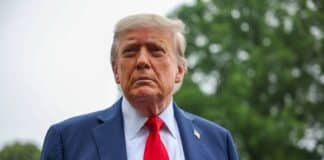Originally published August 1, 2023 10:48 am PDT
A judge in Pennsylvania has determined that former President Donald Trump’s claims disputing the 2020 election results, which he made while in office, are shielded by presidential immunity.
This ruling has dismissed an election worker’s attempt to sue Trump for the aftermath of these statements.
In a verdict delivered on Monday, Judge Michael Erdos of Philadelphia County Court of Common Pleas indicated that Trump’s assertions, made during his presidency, which caused doubt about the election outcomes in Pennsylvania are protected under the presidential immunity doctrine.
Trump’s tweet and his remote remarks from the White House during a Pennsylvania state Senate committee hearing in November 2020 fall under this protection.
Judge Erdos stated, “Other legal proceedings may examine the propriety of his statements and actions while he was the President and whether, as the plaintiffs in this and other cases contend, it was this conduct which served as the actual threat to our democracy,” and further clarified, “But this case is not the proper place to do so. Here, Trump is entitled to Presidential immunity.”
The litigant, James Savage, who oversaw voting machines in Pennsylvania during the 2020 election, had filed two lawsuits.
These have since been merged into one case.
Savage accused Trump, Rudy Giuliani, two poll watchers, and others of conspiring to defame him.
Savage’s lawsuit states that the alleged defamatory statements led to him receiving death threats and suffering two heart attacks.
However, Judge Erdos drew a distinction between Trump’s statements while in office and his actions post-presidency.
The former President does not have immunity for a letter he wrote to the House Jan. 6 committee after his tenure had ended.
That letter is included in Savage’s lawsuit.
In the ruling, Judge Erdos characterized Trump’s official duties as President as encompassing communication on public matters.
“Here, then-President Trump’s Gettysburg remarks and his tweet were public,” Erdos wrote. “Moreover, the topic of these statements—claims from third parties and the President himself about irregularities in the Presidential election which on their face called into question the integrity of the election and whether now-President Joseph Biden had been duly elected—was undoubtedly a matter of great public concern.”
The Justice Department’s investigation of the handover of power post the 2020 election, as well as the events leading up to the Capitol riot on Jan 6, 2021, may result in an indictment against Trump.
Furthermore, his allegations of widespread electoral fraud are currently the subject of multiple other civil lawsuits, The Hill notes.
These are still under consideration in various courts, with Trump claiming immunity in each case.
In response to the ruling, Trump’s legal spokeswoman Alina Habba said, “We are pleased with the Court’s decision to honor the long-standing principle of Presidential Immunity,” and added, “Today, the Court made it clear that it is well within the President’s discretion to address the integrity of our election without fear of liability. We expect that the rest of Mr. Savage’s claims will similarly be disposed of as they are without merit.”






